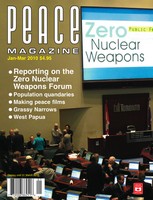
Peace Magazine Jan-Mar 2010, page 27. Some rights reserved.
Search for other articles by Peter Nicholls here
During Fall 2009, I attended two meetings about nuclear weapons. One was the CND conference in London. The other, in Stockholm, dealt with civil society’s role in the Non-Proliferation Treaty. Here are notes I made about these discussions.
The London meeting focused in large part on the problem of NATO. As Kate Hudson pointed out, NATO retains a role for nuclear weapons at the heart of its “concept.” The policy is left over from the Cold War, and is still seen as making some sort of military sense. Removal of nuclear weapons from NATO bases in Europe is key, since the opportunity was lost for nuclear disarmament at the end of the Cold War. Hans Blix attributes this failure in part to a weak Security Council in 1991.
The demand for “security” is so corrosive that CTBT ratification by the US Senate may be unlikely. Indeed Greg Mello recommends that the movement cease to emphasize this demand, lest we are seen as failing. At the CND meeting, US-based Judith Le Blanc and Zia Mian both felt that the Senate may not ratify, at least not before the NPT Review Conference in May, and if and when it does this ‘concession’ will be seen as requiring new nuclear weapons development. Achin Vanaik indicated that India would only ratify if the US does. Many current initiatives such as the Fissile Material Cutoff Treaty (FMCT) are aimed at non-proliferation rather than disarmament and so India will only sign such a treaty if existing stocks are included. Like it or not, we need to acknowledge the linkage between nuclear disarmament and general disarmament.
The illegality of nuclear weapons and the idea of a Nuclear Weapons Convention can be promoted in official and governmental circles, but we must be aware that political attitudes drift. The EU and its Parliament are less enthusiastic this year than last. Whatever the 2010 Review Conference achieves or fails to achieve, NGO pressure must continue. The weekend of 5-6 June 2010 is targeted for post-NPT Review Conference actions. Rebecca Johnson urges us all to help develop events and then participate.
At Stockholm several speakers suggested linking the NPT Review Conference success to promoting the idea of a Nuclear Weapons Convention.
Sergio Duarte saw transparency and accountability as keys to an effective NPT. There are serious problems of secrecy in both nuclear weapons holdings (we only have rough estimates of weapon/warhead numbers and past changes) and policies. The 1995 decision making the NPT permanent was not accompanied by an increase in accountability. There is therefore a need for Nuclear Weapon States to be more forthcoming and to acknowledge an eventual need for a Nuclear Weapons Convention. All current treaties (CTBT/FMCT etc.) are only partial.
Josef Goldblat pointed out how international laws have progressed historically. If we look at examples of earlier Weapons of Mass Destruction conventions such as those governing chemical and biological weapons, we see that “no use” (Geneva, 1925) preceded “no possession” (UN, 1972-1996) by a half century. Prohibition of nuclear weapon use is therefore primary. This might require a diplomatic conference outside the Conference on Disarmament. If use were declared a crime, deterrence would become an invalid concept.
A comparative panel discussion focused on the responsibilities of the Nuclear Weapons States. For Russia, Sergei Kolesnikov (of Russian IPPNW) argued that the Russian defence budget was now low (less than education or health). Russia had no interest in a Cold War continuation; but there is a linkage with US missile defence plans. New strategic concepts are needed on both sides. President Medvedev is serious about renewing START; NGOs are growing in Russia but few advocate outright nuclear disarmament. For the UK, Rebecca Johnson critiqued the continued high profile of nuclear weapons in some UK thinking. Concerns about ballooning cost shows that the debate is not really about national security.
For France, Dominique Lalanne admitted the uniqueness of the French position as a Nuclear Weapon State. Its current focus is entirely on Iran and the Democratic People’s Republic of Korea. It argues that “before the future there is the present” and continues upgrading its delivery systems including a new missile and bomber. New warheads are also planned. There are some positive signs – the removal of the Pacific test site; CTBT compliance; preparedness to be FMCT compliant; a cut in total warhead numbers; and the recent Ricard/Juppe letter. But there is no French political position favoring disarmament. Within the current political context France and UK could offer general support for a Nuclear Weapons Convention, for NATO nuclear weapons removal from Europe, and for reduction in continuous submarine patrols.
Ray Acheson of WILPF said that despite the diminishing “value” of nuclear weapons they are still seen as security guarantees under a new concept of “extended deterrence.”
There is increasing mention of the Nuclear Weapons Convention idea (including in the UN General Assembly) and the chair of the 2010 NPT Review Conference (from the Philippines) supports a Nuclear Weapons Convention.
Peter Nicholls is a biologist living in the UK.

Peace Magazine Jan-Mar 2010, page 27. Some rights reserved.
Search for other articles by Peter Nicholls here